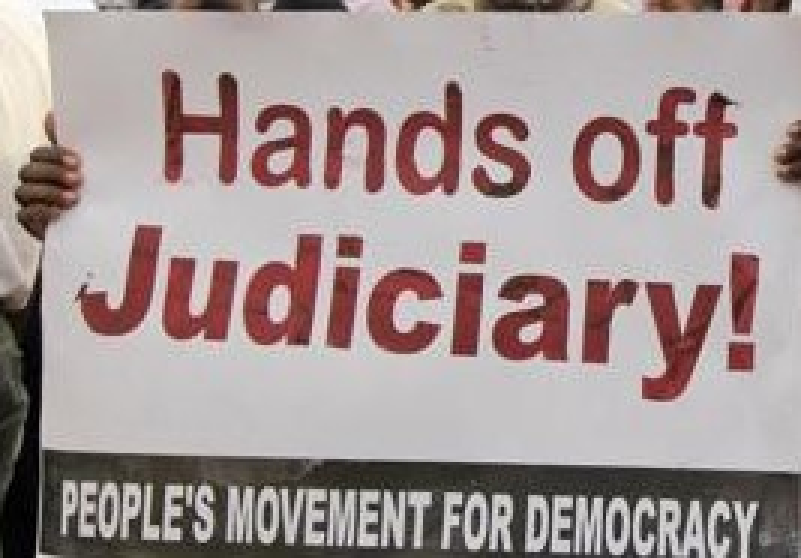(30 August 2023) The ICJ today expressed concern about attacks on the independence of the judiciary in Sri Lanka under cover of parliamentary privilege.
On 22 August 2023, Sarath Weeresekera, a former Minister and a Member of
Parliament belonging to the Sri Lanka Podujana Peramuna, the country’s ruling
political party, made an inflammatory speech with racist undertones in Parliament,
referring to T. Saravanaraja, the Mullaitivu Court’s Magistrate repeatedly as “a
mentally ill person”, and criticizing a court order Judge Saravanaraja had made,
while making personal remarks about him, including a mention of his wife. Judge
Saravanaraja has been the target of this invective following an order he made
upholding the right of religious worship of Hindu devotees at a Hindu shrine on
Kurundur Hill, a contested religious site in the North of the country.
With respect to this, Sarath Weeresekera also stated that the Mullaitivu Magistrate
should keep in mind that Sri Lanka is a Buddhist nation, that there is a limit to the
patience of Sinhala Buddhists, and if any racial violence were to occur it was the
judge and Tamil politicians who should bear the burden. He urged the Judicial
Services Commission and the Bar Association to replace the judge.
Sarath Weeresekera delivered his attack against the judge in violation of standing
order 83 of the Sri Lankan Parliament — according to which the personal conduct of
any person “engaged in the administration of justice shall not be raised except
upon a substantive motion” — during a parliamentary debate on tourism. The ICJ
notes with concern that this is the second time that Sarath Weeresekera has
commented on Judge Saravanaraja and made reference to his ethnicity within
Parliament.
“These speeches constitute a serious and unwarranted encroachment on the
independence of the judiciary and an attack against a judge, solely for his exercise
of his judicial functions”, said Santiago Canton, ICJ’s Secretary General.
The most recent order Judge Saravanaraja made is one of several orders the
Magistrate issued relating to the Kurundur Hill site. A number of previous orders
had been flouted by the Department of Archaeology.
Previously on 7 July 2023 Parliamentarian Weeresekera had made similar remarks
within Parliament stating that the Mullaitivu Magistrate cannot remove the
Sinhalese from the Kurundur Hill religious site as he does not have the authority to
make that decision. Weeresekera mentioned that Tamil judges were acting against
the interest of the Buddhist archeological heritage in the North-East and they do
not have a right to question the archeological Buddhist heritage of the Kurundur Hill
religious site.
The Bar Association of Sri Lanka issued a public statement on 10 July 2023
condemning the parliamentarian’s speech as an “unfounded, brazen attack on the
judiciary and, the social fabric of the country.” On 11 July 2023, Mullaitivu District
lawyers protested against the parliamentarian’s remarks.
The latest speech by Weerasekera was made a few days after another
Parliamentarian, Jayantha Samaraweera, lodged a complaint against the same
Magistrate with the Judicial Services Commission by stating that the Magistrate was
acting unilaterally without heeding the instructions of the Department of
Archaeology which is a State institution.
On 25 August 2023, lawyers in the Northern Province held a protest condemning
the remarks made by the parliamentarian as misuse of parliamentary privilege and
an attack on the independence of the judiciary. Criticising this protest, on 26
August 2023 the parliamentarian stated that he would respond to the lawyers in
Parliament.
“There is a developing trend to use the cover of paliamentary privilege to engage in
rhetoric that interferes with the independence of the judiciary. This sets a
dangerous precedent,” said Canton.
The UN Basic Principles on the Independence of the Judiciary state that, “it is the
duty of all governmental and other institutions to respect and observe the
independence of the judiciary”, and “there shall not be any inappropriate or
unwarranted interference with the judicial process, nor shall judicial decisions by
the courts be subject to revision.”
Previously this year, the ICJ expressed concern about another statement made by yet another parliamentarian calling into question an interim order of the Supreme Court, and requesting the Speaker of Parliament to refer the conduct of the judges of the Supreme Court to the Parliamentary Committee on Ethics and Privileges.
The ICJ recalls that the independence of the judiciary is a fundamental principle of
the rule of law and therefore any form of undue interference by political actors with
judicial independence is extremely serious and should be condemned.
